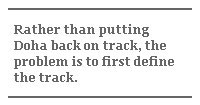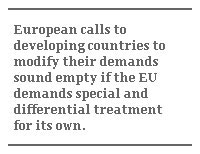‘Hasten Slowly’ in Reviving the Doha Round
'Hasten Slowly' in Reviving the Doha Round

The success of the Doha round will require their leadership on serious agricultural reform.
NEW HAVEN: For those who believe in the necessity of multilateral trade talks, the international scene looks pretty bleak. The Cancun debacle proved that we are far from creating a level global playing field that could eventually help lift millions out of poverty. What is left to do? First of all, countries should not deny the severity of the setback and pretend that the Doha Round can be saved simply by having the negotiators in Geneva return to where the talks were abruptly interrupted. As things stand now, the WTO special General Council meeting in Geneva on December 15 is also bound to end in failure, only adding to the frustration.
It must be first recognized that the Doha agenda was overloaded. In order to get the Round launched, too many requests, without necessarily being consistent among themselves, were accommodated in the agenda and made part of the single undertaking. It's now clear that rather than putting Doha back on track, the problem is to first define the track.

Secondly, given the bigger and more diverse composition of the 148-member WTO, the pure logic of mercantilist negotiations cannot be expected to drive the Doha round. Instead of approaching negotiation as reciprocal concessions, one has to view the Doha round as an undertaking to provide a global public good - a rules-based multilateral trading system.
Thirdly, and most important, there should not be any doubt by now that agriculture is The Issue in the Doha round. No other topic of the Doha agenda will be solved unless the agricultural stumbling block is removed.
In my view, failure to consider these lessons carefully in designing a strategy to restart Doha could be an invitation to another disaster, which would make it much harder to eventually conclude the round and would severely undermine the credibility and efficacy of the WTO. I am not optimistic about the chances of success of a re-launched Doha round, because the players that are supposed to lead in this game - the United States and the European Union - don't seem to be ready yet. And this is happening either because they don't have, at present, the domestic political window to deliver it, or because they think that it's possible to continue playing the old game and still succeed. It's clear that the round's luck will not change without lots of boldness, courage and vision from the part of the U.S. and the EU. Unfortunately, these ingredients are nowhere in sight.

I make this claim after observing how the U.S. and the EU's higher trade officials reacted since the Cancun debacle.
The American officials too readily placed the blame on the countries that led the revolt in Cancun and, even worse, threatened to move toward bilateral and regional agreements to the detriment of multilateral negotiations.
As evidenced by the words and actions of Robert Zoellick's, the US Trade Representative, the signal is clear that Washington is not ready to move, least of all to retake a leadership role, in order to break the Doha round's present deadlock.

The EU's representatives would like to send a different signal than the Americans. Their November 26 report on reviving the Doha negotiations certainly contains a number of positive points, such as the abandonment of the European insistence on the so-called Singapore issues, which must be commended and eventually could help revive the round. But, unfortunately, on the most important front of the Doha round - agriculture - the European Commissioners have stuck to their guns, sending a clear message that at least for the time being they are not ready to put real agriculture reform on the table. This is very much in line with the joint EU-U.S. proposal of last summer which not only failed to commit to the total elimination of export subsidies but lacked a pledge to reduce over time - or at least cap - the amount of total (trade-distorting and non-trade distorting) subsidies to farmers.
In light of these facts, it is regrettable that the European Commission claims that "the new concepts" developed in their joint proposal with the U.S. provide "the foundations for a balanced and fair outcome of the negotiations."
This position greatly diminishes the EC's authority to sustain some of the other points raised in their document that would have significant validity if packaged with a much more progressive agricultural reform.

For example, the European call for developing countries to modify their present demands for special and differential treatment sounds empty if the EU continues to insist on preserving special and differential treatment for its own agricultural production. The same can be said about the Commission's demand that negotiations on non-agricultural products should be anchored to a formula leading to accelerated liberalization. I agree with this, but, would someone explain to me why what is good for non-agricultural products is not also good for farm products?
The European Commissioners, echoing their American counterparts, claim that they need "commensurate movement from other participants, which was and still appears, unfortunately, by and large insufficient or absent altogether. Negotiation is a two-way street."
Well, that is true in a traditional mercantilist negotiation. But in the massively-enlarged WTO, the goal must be different. It's about the provision of a global public good. To build a global public good, leadership is needed. And to have leadership you sometimes have to move - at least for a while - along a one-way street to meet and reach out to others.
Were the U.S. and the EU to provide for that kind of leadership through serious agricultural reform, they would probably be surprised by the willingness and contributions of other nations towards the construction of a strong, liberal, transparent, and non-discriminatory multilateral trading system.
Since there are no clear indications that the transatlantic partners are willing and ready to lead, I remain skeptical that anything positive will be decided at the WTO General Council meeting in Geneva. Perhaps the best that can happen for the sake of the round's eventual success, is that the negotiators will admit that progress in the round is not possible for the time being and formally extend the present deadline for the conclusion of the talks by one or two years. Needless to say, in this context, the so-called 'Peace Clause', which protects countries using subsidies from being legally challenged at the WTO and which is due to expire at the end of 2003, should not be extended.
Honest admission of the deadlock might be better than trying to pretend that real negotiations can be restarted without stronger commitments from the key players. The Cancun collapse was not just an accident. It reflected serious gaps that will not be bridged until awareness of what is really at stake greatly increases in the right places.
Ernesto Zedillo is the Director of the Yale Center for the Study of Globalization and former president of Mexico.